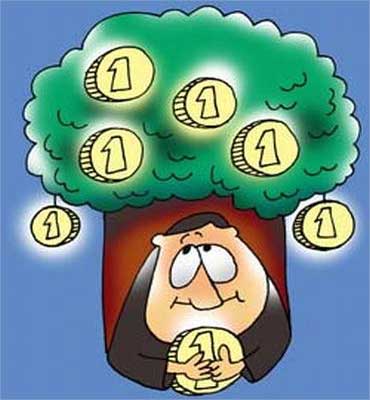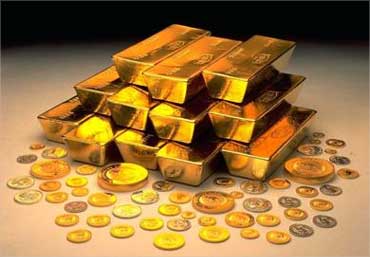Photographs: Illustration: Uttam Ghosh/Rediff Ashish Pai
Banks may offer high interest rates in the 9-10 per cent range on your fixed deposits (FDs), but rising inflation rate (at an average 9.35 per cent in the current financial year), means the real returns on them are much lower.
Fortunately, not all investment options are impacted by rising inflation. Investors should consider inflation and its impact before making investments.
Though FDs are the most preferred savings route, they are no hedge against inflation.
Going by the table, if you were to invest in a one-year SBI Bank FD, the pre-tax return is 8.25 per cent.
Assume you're in the 30 per cent tax bracket, the post-tax return would be 5.7 per cent.
With the inflation rate at 9.35 per cent, you earn negative returns of around 3.65 per cent. It's the same with post office savings and senior citizen deposits too.
| Year | S & P CNX Nifty | Returns (%) | Gold BEES | Returns (%) | SBI Deposit Rate (%) | Inflation (%) |
| 31/03/07 | 3822 | 12 | 948 | NA | 8.25 | 5.40 |
| 31/03/08 | 4735 | 24 | 1212 | 28 | 8.75 | 4.70 |
| 3/3/2009 | 3021 | -36 | 1500 | 24 | 8.50 | 8.30 |
| 31/03/10 | 5249 | 74 | 1608 | 7 | 6.00 | 3.80 |
| 9/3/2011 | 5531 | 5 | 2043 | 27 | 8.25 | 9.35 |
...
Don't let inflation play havoc. Invest smartly
Inflation also has an adverse impact on bonds as the market value goes down with increasing interest rates.
This typically is the case in inflationary times. As a result, you not only lose out on real returns, but also suffer from capital loss on account of decrease in market value.
Assume, you invest in a bond with a face value is Rs 1,000 that earns eight per cent interest.
If the interest rate rises to 10 per cent, the market value of the bond will tend towards Rs 800, so that the yield from the bond is maintained at 10 per cent.
High inflation rates leads to a hike in interest rates which increase the cost of funds companies.
As margins come under pressure, the company's earnings and stock prices will decline.
For instance, if company A's profit before interest and taxes (PBIT) was Rs 10 crore (Rs 100 million) and it had a borrowing of Rs 25 crore (Rs 250 million) at 10 per cent, the PBT will be Rs 7.50 crore (Rs 75 million).
...
Don't let inflation play havoc. Invest smartly
Suppose the interest rate increases to 12 per cent; then PBIT will be Rs 7 crore (Rs 70 million), resulting in lower earnings per share (EPS).
An increase in salaries and wages due to inflation can also result in lower earnings and valuations.
The earnings of banks and financial institutions are hurt due to lower net interest income in case of rising interest rates.
However, companies with a monopoly in their field or having high operating margins, benefit during inflationary times.
Information technology and other IT-enabled services' companies can also benefit, since they can hike their billing rates.
...
Don't let inflation play havoc. Invest smartly
Let's look at investment avenues which do better in inflationary times.
The bull run in property prices is propelled by inflation.
Besides capital appreciation, the rentals on residential property, especially in metro cities, surge with inflation.
Commodities are real assets, comprising inherent intrinsic value, based on their actual commercial or industrial application.
Commodity prices usually have direct correlation with inflation.
Investing in commodities that rise with inflation provide a natural hedge against the latter.
It is a good tool to diversify your portfolio.
...
Don't let inflation play havoc. Invest smartly
A person can invest in commodities by way of investing in bullion or in commodity futures. Metals like silver, copper, aluminium have shown a distinct upward trend in prices.
Gold is an important hedge against inflation. You can invest in gold in the form of bars, coins, and jewellery.
You can also invest in Gold ETFs (exchange traded funds) that works as a liquid and low-cost investment avenue as against physical gold.
The table, shows the percentage change in Gold BEES (benchmark exchange traded scheme) year on year versus inflation. It is clear the returns are directly correlated to the inflation rate.
The author is a freelance writer






article